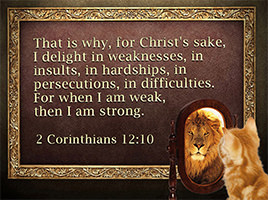Second Corinthians 12:1–10 . . .
Our Extremity Is God’s Opportunity
In these closing chapters, Paul’s caught up in a oneupmanship game. He doesn’t want to be there, but he is. The false apostles who boasted about their exploits and faithful dedication were hypnotizing the Corinthian church into believing that they were true apostles of Christ while teaching them false things. To regain the Corinthians’ attention, Paul compares notes with them, in a sense, boasting of his exploits as a result of incredible hardships: beatings, fasts, imprisonments, stoning, shipwrecks, dangers from every side. He also includes the almost embarrassing story about the night he had to be let down over a wall in a basket, in order to escape a plot to take his life. That doesn’t sound like much to boast about, because it represented a collapse of all his dreams and plans.
However, early in chapter 12, Paul describes two experiences worth boasting about. He speaks of a man (widely believed to be himself, speaking in the third person out of humility or to avoid sounding arrogant) who was "caught up to the third heaven" and "into paradise" and, immediately after describing the profound revelation, (2) he presents an accompanying story about him having been given a thorn in the flesh. Note: He suggests that he had more than one vision of “paradise” (v. 1b, shown below).
This was the basis of his claim of being an apostle. Doctor Luke tells us that “Apostles were those who’d seen the risen Lord after his resurrection.” Paul, of course, wasn’t one of the original twelve, but he had personally seen Christ on the Damascus road. Now Paul tells us that there were many occasions when he had visions of the Lord. His visions weren’t a fantasy or something he imagined; he actually saw the Lord; the Lord appeared to him and taught him. As a result, he was an apostle. In vv. 2–4, Paul tells us that Jesus himself had taught him what he’d learned: the truths of the preached gospel. After many years of ministering around the world, Paul had a chance one day to compare notes with the original apostles — Peter, James, John, Luke, and others — and he tells us in Galatians that they could add nothing to what he’d learned directly from the Lord, in personal appearances.
It’s odd that Paul tells his paradise account in the third person, as though it happened to someone else. In v. 7, he makes very clear that it actually happened to him. A number of things are clear from what he says in today’s passage:
(a) It was obviously an experience where he went beyond this present life; he entered, he says, “the third heaven,” later referred to as “paradise.” [The “third heaven” was a reference to the Jewish belief about the structure of the universe, which had three heavens: (1) the atmosphere around the earth, the clouds, etc.; (2) the second heaven consisting of the far-away stars, sun, and moon; and (3) the invisible realm where God’s throne was (a.k.a. paradise). It doesn’t mean that the third heaven is somewhere out in space; it means that it’s not visible to our senses today. It constitutes a kind of “fourth dimension of life” into which Apostle Paul was taken.]
(b) Paul also tells us is that his body was rather unimportant in this event that he’s describing (v. 3b): If he was in the body, he wasn’t aware of it; if he was out of the body, he didn’t miss it. Though he wasn’t sure from his feelings how the body fit in, it’s clear that it was a great experience of relaxed enjoyment for him.
(c) He also informs us that he wasn’t permitted to tell us about what he’d heard. He likely heard some marvelous things that contributed greatly to his understanding of life and reality, helping him appreciate what exists and what God does. But he couldn’t describe these things in earthly words.
You might expect that this was an experience worth boasting about while putting down the false apostles, challenging them to come up with something greater. But remarkably, he doesn’t do that. In fact, he goes on to say in v. 5 that he’ll boast only of his weaknesses! “What you see is what you get,” is the apostle’s motto. He isn’t making any claims about anything unusual in his ministry. In effect, he says: I haven’t spoken of this for 14 years; now I speak reluctantly. I don’t want to boast about it. In fact, what I want to boast about I haven’t yet gotten to. This vision of Paradise is the introduction to what I have to say. With that, Paul writes vv. 7–9, telling us, his readers: That’s my point of boasting — I’ll boast only about my weaknesses.
Everyone wants to know immediately what that “thorn” was; the possibilities are endless. Suffice it to say that it was given to him to humble him, to keep him from being too elated about the revelations he had. Notice how in v. 7b (“I was given a thorn in my flesh, a messenger of Satan, to torment me”) that both the Lord and Satan are involved in this together (reminiscent of how the book of Job begins). Do you see herein a combination of two forces? Satan’s purpose was to destroy and harass Paul, to make life miserable for him (and each of us) while God’s purpose was to strengthen Paul, to humble and keep him effectively usable in his hands.
Whatever that thorn in Paul’s flesh was, he didn’t like it. So he pleaded about it to the Lord three times (v. 8). He knew that the worst thing he could do was become arrogant and conceited about his revelation. It was evidently more important to God to keep Paul humble than it was to make him comfortable, so he sustained Paul’s thorn.
Paul concludes in vv. 9–10 that he’d never permit himself to brag about what he was doing. If he was about to boast, he’d find an area of weakness and boast about that. Underscoring the spiritual battle that engages every believer, Paul advises us here: Never permit yourself to brag about what you’re doing or what you’ve done. If you find yourself wanting to boast, find one area of weakness and boast about it. After all, when I’m weak, then I’m strong. Let’s face it: Trouble comes, difficulties hit all of us, three or four at a time on occasion; but those aren’t times to complain, they’re opportunities to fight and to win.
Note: 2nd Corinthians encourages believers to embrace and follow the way of Jesus that transforms lives and values generosity, humility, and weakness. In chapters 10–13, Paul presents these four elements:
Paul defends his authority (ch. 10) | The false apostle and Paul (ch. 11)
Paul’s vision and thorn in the flesh (ch. 12) | Paul’s final advice and greetings (ch. 13)
› Watch BibleProject’s superb animated video (2 min.) that highlights Paul’s messages in these four chapters.
† Summary and Key Points of 2 Corinthians 12:1–10
Here’s my summary of this ten-verse passage.
Herein, Paul continues his defense of his apostleship by describing a profound spiritual experience — being caught up to the “third heaven” — but chooses not to boast in these visions. Instead, he focuses on a personal struggle, a “thorn in the flesh,” which he says was given to keep him humble. Despite pleading with the Lord three times for its removal, God responds by assuring Paul that the Lord’s grace is sufficient and that his power is made perfect in weakness. Paul concludes that he’ll gladly boast in his weaknesses so that Christ’s power may rest on him, declaring, “For when I am weak, then I am strong.”
Its four key points:
1. Paul’s Vision of Paradise (vv. 1–6)
• Paul recounts a remarkable vision, where he was “caught up to the third heaven” and “paradise,” hearing things too wonderful to express. He’s describing a profound, supernatural experience, likely his own, though he refers to himself in the third person to avoid boasting.
• “The third heaven” likely refers to the dwelling place of God. (See here what ancient Jewish cosmology considered to be “multiple heavens.”) The combined phrase “third heaven, …paradise” emphasizes that Paul was granted an extraordinary and intimate experience in the very presence of God. It signifies the highest possible spiritual revelation.
• Paul shares this experience not to boast, but to defend his apostolic authority against those who were challenging him in Corinth. While he usually shies away from self-praise, he uses this vision as evidence of his direct revelation from the Lord, putting him on par with, or even above, his detractors who claimed special insights.
2. The Thorn in the Flesh (vv. 7–8)
• To prevent pride from his extraordinary revelations, Paul was given a “thorn in the flesh,” described as a “messenger of Satan” sent to torment him.
• Paul prayed three times for its removal, but God didn’t grant his request.
3. God’s Response: Grace and Power in Weakness (v. 9)
• God tells Paul, “My grace is sufficient for you, for my power is made perfect in weakness.”
• Paul’s response: “Therefore I will boast all the more gladly about my weaknesses, so that Christ’s power may rest on me.”
4. Boasting in Weakness (v. 10)
• Paul declares that he delights in weaknesses, insults, hardships, persecutions, and difficulties for Christ’s sake.
• The paradoxical principle: “For when I am weak, then I am strong.”
. . . Three Takeaways of Paul’s Passage
#1 God uses our weaknesses to display his power and grace.
#2 Persistent prayer may not always yield the answer we desire, but God’s response is always sufficient.
#3 True spiritual strength is found in humble dependence on Christ, not in personal achievements or supernatural experiences.
- Q. 1 Why doesn’t Paul play the boasting game of the false apostles (see 4:5–7; 10:12–18)?
- Q. 2 How has Paul’s thorn affected his life?
- Q. 3 How has God worked in and through you during a time of weakness?
2 Corinthians 12:1–10
New International Version (NIV)
[You can view it in a different version by clicking here; you can also listen to chapter 12.]
Paul's Vision and His Thorn
12 I must go on boasting. Although there is nothing to be gained, I will go on to visions and revelations from the Lord. 2I know a man in Christ who fourteen years ago was caught up to the third heaven. Whether it was in the body or out of the body I do not know — God knows. 3And I know that this man — whether in the body or apart from the body I do not know, but God knows — 4was caught up to paradise and heard inexpressible things, things that no one is permitted to tell. 5I will boast about a man like that, but I will not boast about myself, except about my weaknesses. 6Even if I should choose to boast, I would not be a fool, because I would be speaking the truth. But I refrain, so no one will think more of me than is warranted by what I do or say, 7or because of these surpassingly great revelations. Therefore, in order to keep me from becoming conceited, I was given a thorn in my flesh, a messenger of Satan, to torment me. 8Three times I pleaded with the Lord to take it away from me. 9But he said to me, “My grace is sufficient for you, for my power is made perfect in weakness.” Therefore I will boast all the more gladly about my weaknesses, so that Christ’s power may rest on me. 10That is why, for Christ's sake, I delight in weaknesses, in insults, in hardships, in persecutions, in difficulties. For when I am weak, then I am strong.



